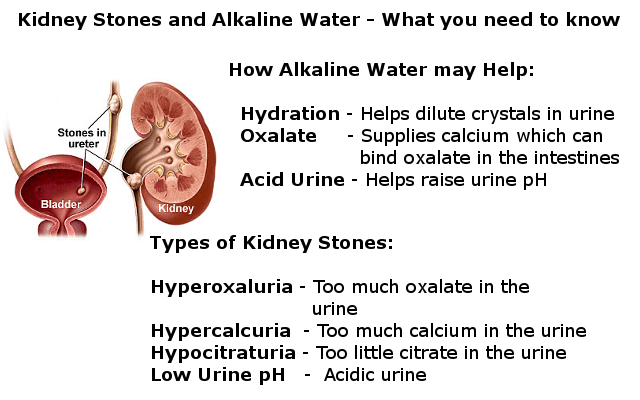Kidney stones form when your urine has too high a concentration of crystals and /or not enough of the substances that prevent crystals from forming. Drinking adequate amounts (about 1.5 – 2 liters) of water every day can help you avoid forming stones by preventing crystals in your urine from becoming concentrated. There are other factors such as low urine pH that can also contribute to stone formation. Alkaline water can be used to raise your urine’s pH, but you should speak to your doctor. There are a few different kinds of kidney stones, some may be helped by drinking alkaline water, and some won’t. So only your doctor knows for sure if alkaline water is right for you.
Alkaline Water and Kidney Stone Prevention

Drinking water is “the most basic thing you can do to prevent stone formation” according to the Brady Urological Institute. Your goal should be to produce 2 liters of urine per day. Alkaline water will supply some calcium, which binds to oxalate (a component of kidney stones) in the intestines.
Causes of Kidney Stones
Hyperoxaluria (too much oxalate in the urine) – Calcium oxalate stones form when there is excess oxalate in the urine and/or not enough calcium in the diet. Doctors will often recommend a low oxalate diet with normal calcium intake.
Hypercalciuria (too much calcium in the urine) – Doctors will treat this by prescribing drugs to lower calcium excretion. Some of these drugs increase urine pH. Calcium binds to sodium in the urine. So the more sodium you consume, the more calcium you will discharge in your urine. For this reason, your doctor may recommend a low sodium diet.
It is important to note that you should maintain a normal intake of calcium even with hypercalciuria. Normal consumption of alkaline water may actually help reduce calcium excretion by raising urine pH
Hypocitraturia (too little citrate in the urine) – Citrate is a molecule that binds to calcium in the urine, which can prevent it from forming stones. Doctors typically prescribe citrate supplements for this. There is some evidence you can also raise urine citrate levels by drinking citrus juices like lemonade and orange juice.
You can make both orange juice and lemonade more alkaline with alkaline water. This can supply your body with both citrate and alkalinity, since alkaline water will raise the pH of both juices somewhat.
Hyperuricosuria (too much uric acid in the urine) – Excess uric acid in your urine can be the result of excessive protein intake. A doctor will typically recommend a low protein diet Alkaline water can also help by providing adequate hydration to help dilute levels of uric acid.
Low Urine pH (acid urine) – If your urine pH is too low, your doctor may prescribe medicine to raise your urine pH. You should tell your doctor that you’re thinking about drinking alkaline water and follow their guidance to the letter. Your doctor may wish to monitor the increase in urine pH caused by alkaline water and the medication you are prescribed.
What to tell your doctor about alkaline water
Alkaline water from a water ionizer has been shown in studies to raise urine pH. Alkaline water, as made by a water ionizer, gets its pH and alkalinity from mineral hydrates – mostly calcium hydroxide and magnesium hydroxide. The amount of these in your water will be determined by how much mineral carbonates – calcium carbonates and magnesium carbonates – are in your tap water. A water ionizer converts mineral carbonates to mineral hydrates. Your local water quality report contains information about the mineral carbonate content of your water.
Click here for a free water quality report
Conclusion: Alkaline water can provide needed calcium and elevate pH balance, but only your doctor knows for sure if that’s right for you. If you have had a history of kidney stones, talk to your doctor about alkaline water. Don’t forget the importance of a healthy diet either.
Want to know if you have a health challenge that can be helped by alkaline water? Call us today at 877-959-7977 for a free consultation
References
“HOW CAN KIDNEY STONES BE PREVENTED.” The James Buchanan Brady Urological – Kidney Stone. Johns Hopkins School of Medicine. Web. 8 Jul 2013. <http://urology.jhu.edu/kidney/STONESprevention.php>.
1 comment